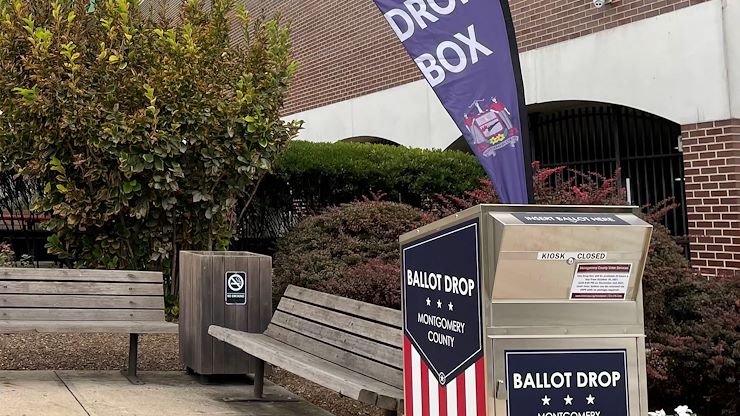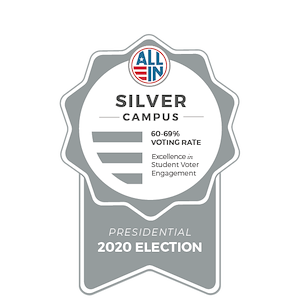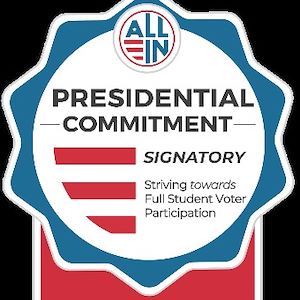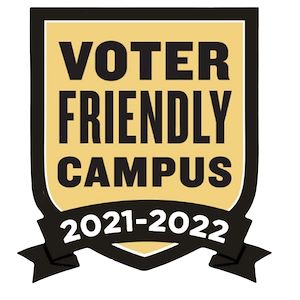
Washington Monthly recently named MCCC as one of the 2022 Best Colleges for Student Voting Honor Roll following its efforts to promote voting among students on campus.
Montgomery County Community College continues to receive accolades for its efforts to support civic duty among students. The College was recently included in Washington Monthly's 2022 Best Colleges for Student Voting Honor Roll.
According to the report, in order to be included in this year’s honor roll “universities had to submit 2020 and 2022 action plans to the ALL IN Campus Democracy Challenge. Schools also needed to have signed up to receive data from the National Study of Learning, Voting, and Engagement (NSLVE), which calculates college-specific registration and voting rates. And they must have made their 2018 and 2020 NSLVE data available to the public. In short, schools need to have shown a repeated commitment to increasing student voting—and have been transparent about the results.”
MCCC joins a list that includes Ivy League schools, such as Harvard and Princeton universities, as well as a number of area four-year colleges and universities. Being named to the honor roll is recognition of the significant efforts MCCC has continued to make to encourage students to use their voices by casting a ballot.
“The College is very proud of our students’ commitment to civic engagement,” said Michael Bettinger, MCCC Director of Government and External Relations. “They understand the importance of being involved, and the College works to support that by providing information, resources, and opportunities to engage in the democratic process.”
Political Science classes also regularly invite elected officials to campus and interact with students, he said.
This isn’t the first time the College has been recognized for its efforts to promote voting among students either. Last year MCCC was designated as a Voter Friendly Campus and earned recognitions by the All-In Campus Democracy Challenge for its high rate of student voter registration and turnout for the 2020 election.
 MCCC also earned the highest voter registration and highest voter turnout awards for
two-year institutions in the State Challenges Awards for nonpartisan student voter participation efforts in the 2020 election. In addition,
the College received the 2020 Silver Seal from the All-In Campus Democracy Challenge for achieving a greater than 60 percent
turnout. More than 840 two- and four-year higher education institutions from across
the country participate in the All-In Challenge.
MCCC also earned the highest voter registration and highest voter turnout awards for
two-year institutions in the State Challenges Awards for nonpartisan student voter participation efforts in the 2020 election. In addition,
the College received the 2020 Silver Seal from the All-In Campus Democracy Challenge for achieving a greater than 60 percent
turnout. More than 840 two- and four-year higher education institutions from across
the country participate in the All-In Challenge.
 As part of MCCC’s designation as a Voter Friendly Campus, MCCC President Dr. Victoria
Bastecki-Perez became a signatory of the All-In Higher Education Presidents’ Commitment
to Full Voter Participation. For this commitment, MCCC increased its voter registration
efforts to incorporate more online registration and provided consistent messaging
to students and employees about voter registration, mail-in and absentee ballots and
voting rights.
As part of MCCC’s designation as a Voter Friendly Campus, MCCC President Dr. Victoria
Bastecki-Perez became a signatory of the All-In Higher Education Presidents’ Commitment
to Full Voter Participation. For this commitment, MCCC increased its voter registration
efforts to incorporate more online registration and provided consistent messaging
to students and employees about voter registration, mail-in and absentee ballots and
voting rights.
 In addition, MCCC’s Pottstown and Blue Bell Campuses served as polling precincts during
the 2020 elections, as well as the recent 2021 elections. The Pottstown Campus also
served as a secure ballot drop-off location for the elections.
In addition, MCCC’s Pottstown and Blue Bell Campuses served as polling precincts during
the 2020 elections, as well as the recent 2021 elections. The Pottstown Campus also
served as a secure ballot drop-off location for the elections.
During the 2020 presidential election, MCCC’s voting rate was 66.9 percent. This represents an increase of 6.3 percent from the 2016 election, and 16.9 percent increase from 2012, according to the NSLVE, a research study of the Institute for Democracy in Higher Education (IDHE) at the Jonathan M. Tisch College of Civic Life at Tufts University. The voting rate is determined by the percentage of eligible students who voted on Election Day.
For the 2020 election, 77.3 percent of MCCC’s total number of students were registered to vote, and 86.5 percent of the registered students voted. MCCC’s voting rate was 11 percent higher than the national average for two-year institutions. Approximately 66 percent of MCCC students voted in person, and 32 percent voted by mail or absentee ballot.
According to the NSLVE, students across the country voted at high rates in the 2020 election, with voter turnout jumping to 66 percent in last year’s presidential election. The 14-percentage point increase, from the 52-percent turnout in the 2016 election, outpaces that of all Americans, which jumped 6 percentage points from 61 percent to 67 percent, according to the U.S. Census Bureau.
The Institute for Democracy & Higher Education’s National Study of Learning, Voting, and Engagement is the nation’s largest study of college and university student voting. Institutions must opt-in to the study, and at this time, nearly 1,200 campuses of all types—community colleges, research universities, minority serving and women’s colleges, state universities, and private institutions—participate. The dataset reflects all 50 states and the District of Columbia and includes 49 of the nation’s 50 flagship schools. IDHE uses de-identified student records to ensure student privacy. The 2020 dataset is robust with 8,880,700 voting-eligible students representing 1,051 colleges and universities.
The All-In Campus Democracy Challenge is a national, nonpartisan initiative of Civic Nation, a 501(c)(3) organization. All-In strives for a more inclusive democracy—one in which all voices are heard. All-In believes that higher education plays a role in graduating students into voters and in closing electoral participation gaps that persist by race and age. Through an intentionally designed program, which provides structure, support, and recognition, All-In strengthens college and university efforts to improve civic learning, political engagement, and voter participation. Ensuring that students are registered to vote and participate in all elections is a key component of All-In’s work.
